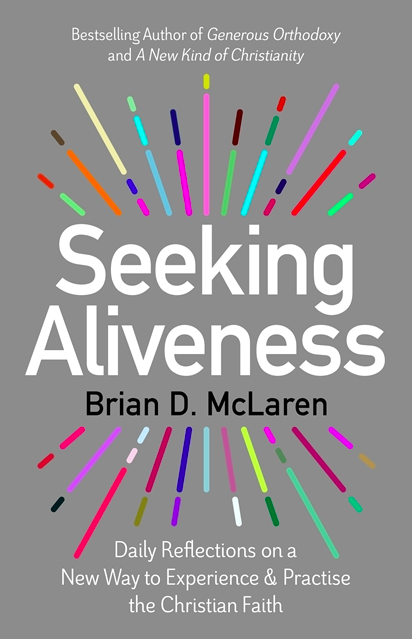Seeking Aliveness by Brian D. McLaren
'We should live as he tells us to live, but we should believe far more than he tells us to believe.'
 Seeking Aliveness - Daily reflections on a new way to experience and practise the Christian faith
Seeking Aliveness - Daily reflections on a new way to experience and practise the Christian faith
By Brian D. McLaren
Hodder and Stoughton
ISBN: 978-1-473-67141-6
Reviewer: Pieter Lalleman
'This book has been created from material originally published as We Make the Road by Walking', says the copyright page. It seems as if it contains devotional pieces for the 365 days of a year; but because often not seven but only four, five or six pieces per week are given, the actual total is much lower. Two to four readings per week are suggested, but McLaren's reflections are often only loosely connected to these readings. He is not a biblical scholar, he is a man with his own message.
Brian McLaren reminds me of Steve Chalke: a deep love for Jesus, much practical and biblical wisdom, but a liberal approach to the Scriptures. He states that the Scriptures are so full of contradictions that we in fact have to make our own selection of what we accept and what we reject.
Well, what we reject is clear: the nationalism and the violence which we find in some places in the Bible. This is McLaren's one big theme: God and the good bits of Scripture are non-violent. God and Jesus are always on the side of the poor, but never with violent means. When Jesus speaks about hell, it's never meant to be taken literally.
All of this means that McLaren presents a very selective reading of the Bible. There is almost nothing on the meaning of the cross.
The difference between McLaren and the old Liberals is that they came across as grumpy old men who angrily hacked away anything they didn't like, leaving us with a bare, sombre Christianity.
McLaren (like Chalke) makes Christianity very attractive: life with Jesus is the true aliveness, the real openness to other people and to the world. That's all good. The world would be a far better place if we lived as he commends and Trump would not have been elected.
But by the wayside you find the things he has chopped off, such as the divinity of Jesus, sin as guilt, the atonement and even the resurrection. McLaren reduces important concepts like 'Son of God' and 'Messiah' to political programmes. In the end his 'gospel' is anthropocentric (= it centres on humans, not on God). Where the Bible says that God intervenes, McLaren reduces this to human winning new insights.
This book presents us with a very attractive Liberalism, but it's still Liberalism. We should live as McLaren tells us to live, but we should believe far more than he tells us to believe.
Dr Pieter J. Lalleman teaches New Testament at Spurgeon’s College
Baptist Times, 22/06/2018